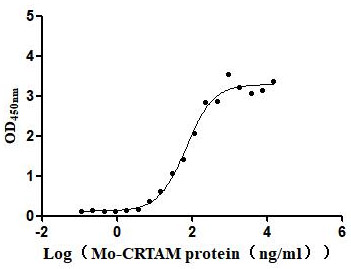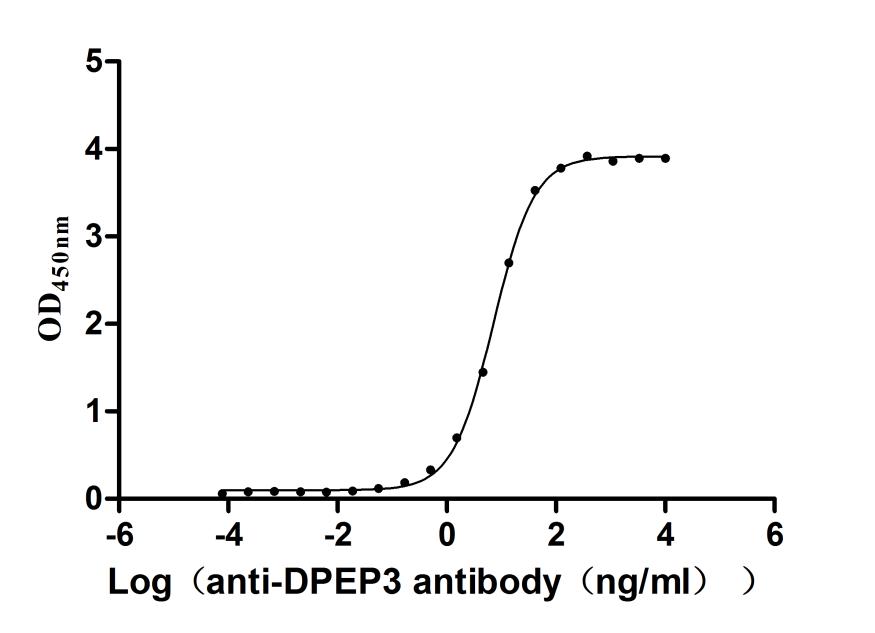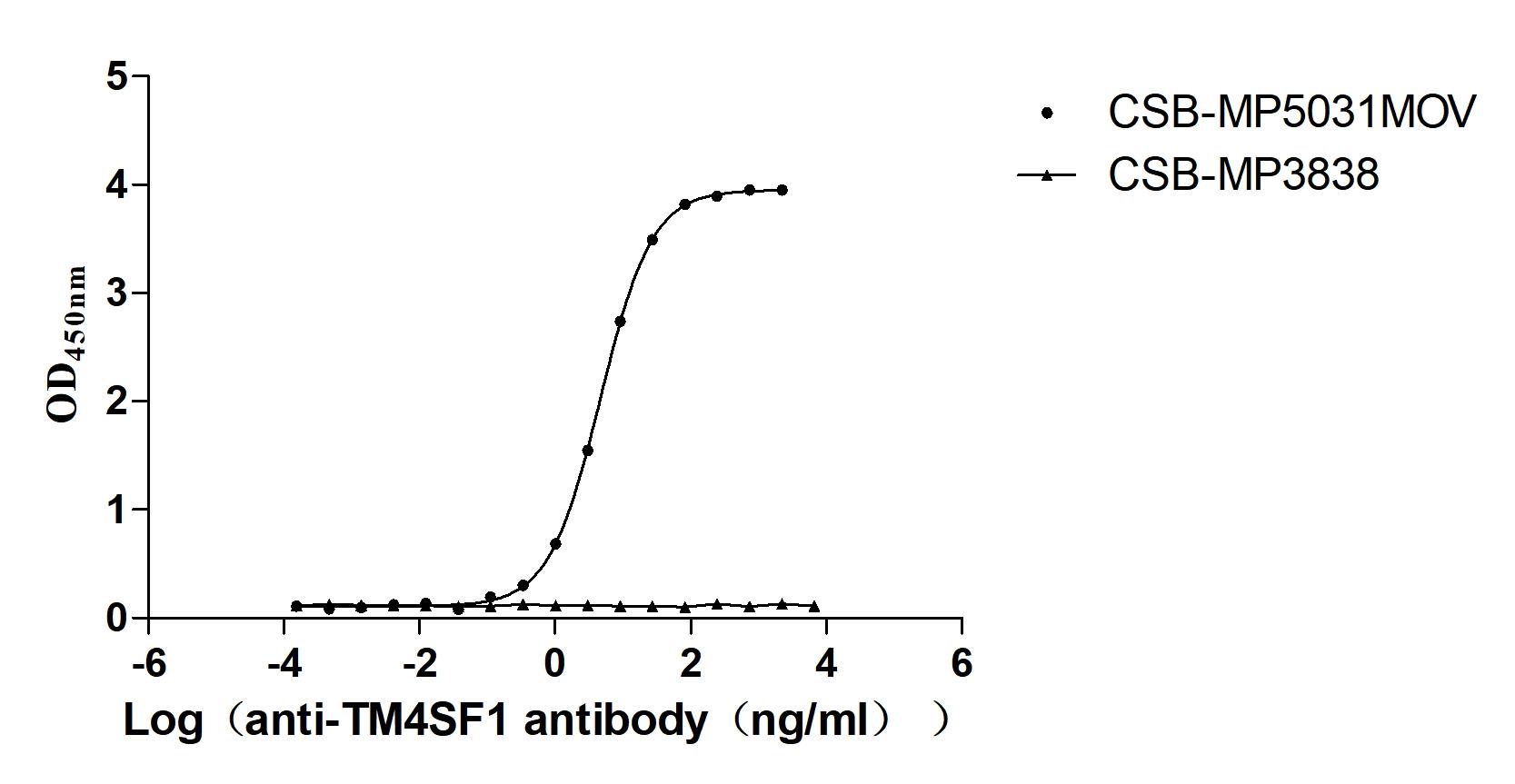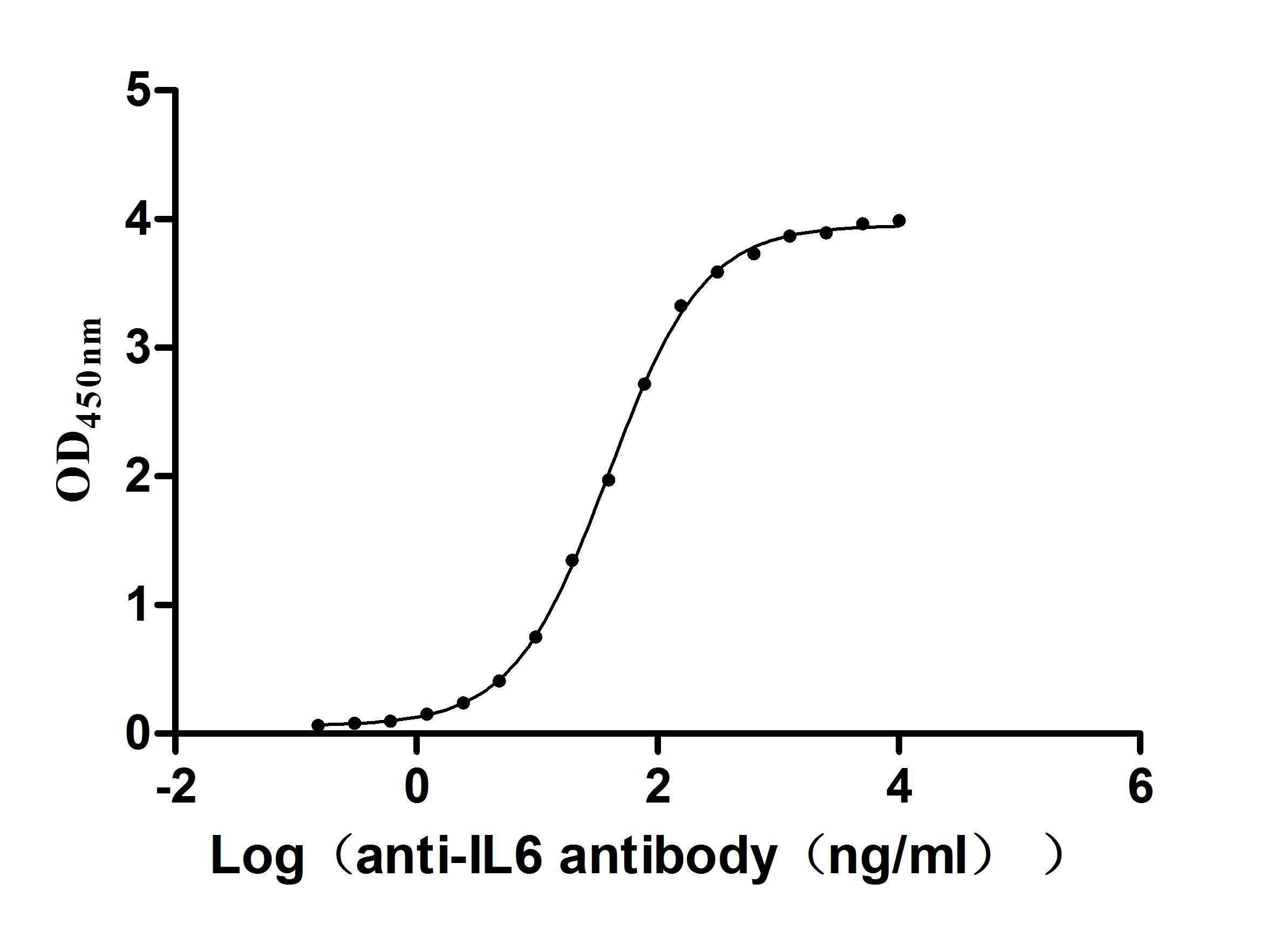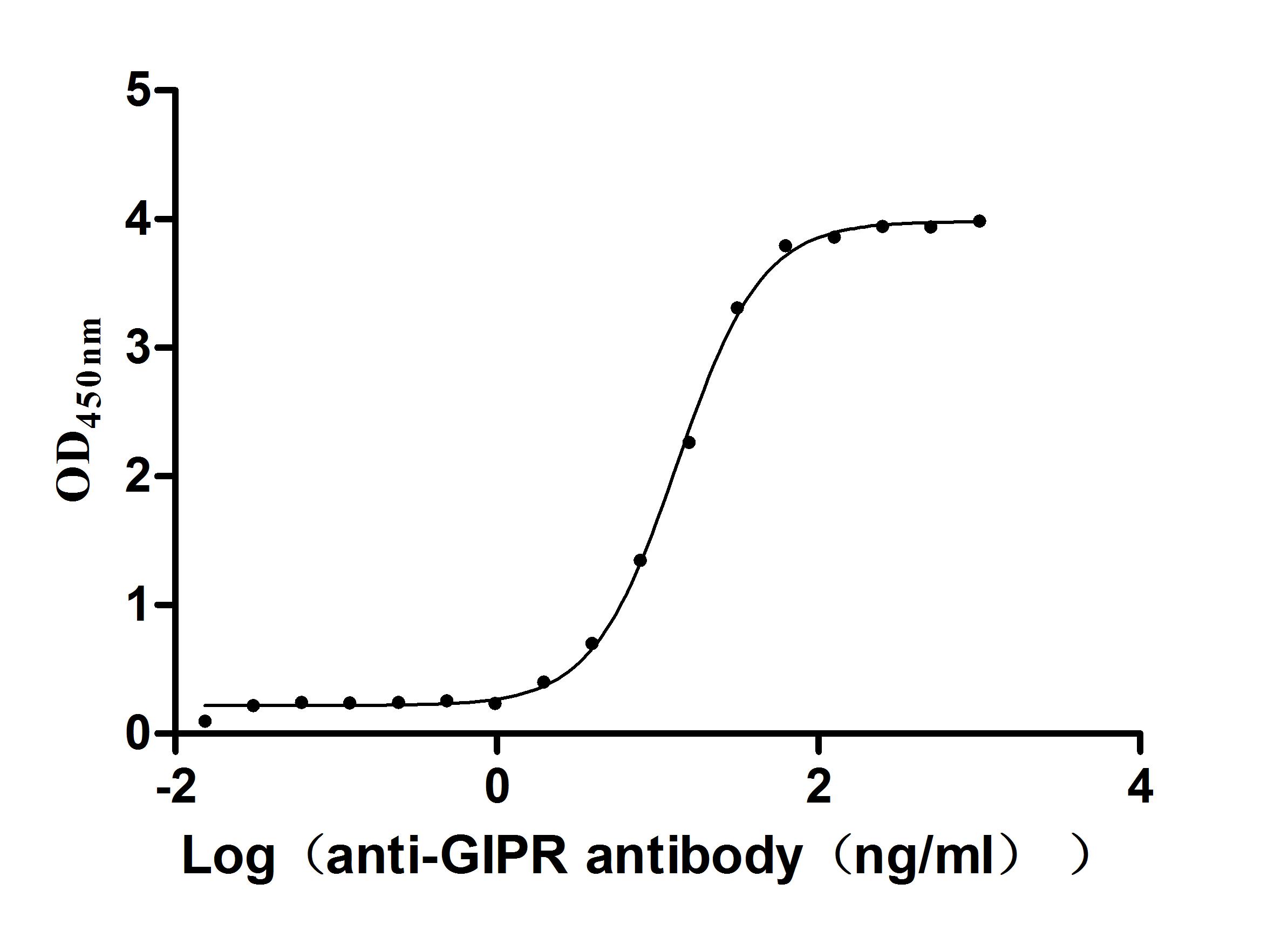Recombinant Human GTPase KRas (KRAS), partial
In Stock-
货号:CSB-EP012493HU1
-
规格:¥1344
-
图片:
-
其他:
产品详情
-
纯度:Greater than 90% as determined by SDS-PAGE.
-
基因名:
-
Uniprot No.:
-
别名:c Ki ras2; c Kirsten ras protein; c-K-ras; c-Ki-ras; Cellular c Ki ras2 proto oncogene; Cellular transforming proto oncogene; CFC2; cK Ras; GTPase KRas; K RAS p21 protein; K RAS2A; K RAS2B; K RAS4A; K RAS4B; K-Ras 2; KI RAS; Ki-Ras; KIRSTEN MURINE SARCOMA VIRUS 2; Kirsten rat sarcoma 2 viral (v Ki ras2) oncogene homolog; Kirsten rat sarcoma viral oncogene homolog; KRAS; KRAS proto oncogene, GTPase; KRAS1; KRAS2; N-terminally processed; NS; NS3; Oncogene KRAS2; p21ras; PR310 c K ras oncogene; PR310 cK ras oncogene; RALD; RASK_HUMAN; RASK2; Transforming protein p21; v Ki ras2 Kirsten rat sarcoma 2 viral oncogene homolog; v Ki ras2 Kirsten rat sarcoma viral oncogene homolog
-
种属:Homo sapiens (Human)
-
蛋白长度:Partial
-
来源:E.coli
-
分子量:23.1kDa
-
表达区域:2-168aa
-
氨基酸序列TEYKLVVVGAGGVGKSALTIQLIQNHFVDEYDPTIEDSYRKQVVIDGETCLLDILDTAGQEEYSAMRDQYMRTGEGFLCVFAINNTKSFEDIHHYREQIKRVKDSEDVPMVLVGNKCDLPSRTVDTKQAQDLARSYGIPFIETSAKTRQRVEDAFYTLVREIRQYRL
Note: The complete sequence including tag sequence, target protein sequence and linker sequence could be provided upon request. -
蛋白标签:N-terminal 6xHis-tagged
-
产品提供形式:Liquid or Lyophilized powder
Note: We will preferentially ship the format that we have in stock, however, if you have any special requirement for the format, please remark your requirement when placing the order, we will prepare according to your demand. -
缓冲液:Tris-based buffer,50% glycerol
-
储存条件:Store at -20°C/-80°C upon receipt, aliquoting is necessary for mutiple use. Avoid repeated freeze-thaw cycles.
-
保质期:The shelf life is related to many factors, storage state, buffer ingredients, storage temperature and the stability of the protein itself.
Generally, the shelf life of liquid form is 6 months at -20°C/-80°C. The shelf life of lyophilized form is 12 months at -20°C/-80°C. -
货期:3-7 business days
-
注意事项:Repeated freezing and thawing is not recommended. Store working aliquots at 4°C for up to one week.
-
产品描述:
The Human KRAS recombinant protein is conventionally generated by transfecting the recombinant DNA into a host cell, and then the host cells are cultured and the transfected DNA transcribed and translated. Different host cells can be chosen for recombinant protein production, the choice of which depends on the type of protein that needs to be generated, its functional activity and requisite yield. We choose E.coli as the expression system for this KRAS protein expression because bacteria cells are easy to culture, grow fast and produce high yields of recombinant protein.
KRAS is a protein coding gene that encodes GTPase KRas. According to some research, KRAS may have the following features.
KRAS mutation status predicts colorectal cancer response to cetuximab therapy. KRAS proteins play an important role in human cancers but have not yet succumbed to therapeutic attack. By determining the mutational status of EGFR and KRAS, treatment decisions regarding the use of these kinase inhibitors may be improved. GTPase KRAS inhibits the p53 tumor suppressor by activating the NRF2-regulated antioxidant defense system in cancer cells. The quantitative biophysical analysis identified key components that regulate the recruitment of the GTPase KRAS to the plasma membrane. -
Datasheet & COA:Please contact us to get it.
相关产品
靶点详情
-
功能:Ras proteins bind GDP/GTP and possess intrinsic GTPase activity. Plays an important role in the regulation of cell proliferation. Plays a role in promoting oncogenic events by inducing transcriptional silencing of tumor suppressor genes (TSGs) in colorectal cancer (CRC) cells in a ZNF304-dependent manner.
-
基因功能参考文献:
- Pesticide exposure may play a great role in malignant transformation of urinary bladder cells through mutation in the K-ras gene. PMID: 29644616
- deletion of the oncogenic KRAS allele resulted in enhanced STIM1 expression and greater Ca(2+) influx. PMID: 29748135
- PIP5K1A loss reduces oncogenic KRAS signaling. PMID: 30194290
- GATAD2B interacts with C-MYC to enhance KRAS driven tumor growth. PMID: 30013058
- the present study demonstrates that miR-422a may serve as a tumor suppressor in osteosarcoma via inhibiting BCL2L2 and KRAS translation both in vitro and in vivo Therefore, miR-422a could be developed as a novel therapeutic target in osteosarcoma. PMID: 29358307
- our studies demonstrate how KRAS inhibits the tumor suppressor RKIP, thus offering novel justification for targeting RKIP as a strategy to overcome KRAS-induced tumor metastasis and chemoresistance in PDAC. PMID: 29315556
- This study confirms the tumor suppressor roles of miR-193a-3p, its downstream target affinity to KRAS and clinical significance in patients with colorectal adenocarcinoma. PMID: 29104111
- in Stage I colorectal cancer presence of KRAS mutations, that of simultaneous mutations in PIK3CA gene, or that of multiple KRAS mutations was significantly associated with shorter cancer specific survival; PIK3CA or multiple KRAS mutations were associated with nodal micrometastases and poorly differentiated clusters G3 as well PMID: 30018674
- Inhibition of Wee1 by its specific inhibitor MK1775 in combination with sorafenib restored the KRAS mutated cells' response to the multi-target tyrosine kinase inhibitor. PMID: 29343688
- High FOS-like antigen 1 (FOSL1) expression with mutant KRAS protein lung and pancreatic cancer patients showed the worst survival outcome. PMID: 28220783
- primary resistance to cetuximab is dependent upon both KRAS mutational status and protein expression level, and acquired resistance is often associated with KRAS(Q61) mutations that function even when protein expression is low. PMID: 28593995
- The HSF1-BAG3-Mcl-1 signal axis is critical for protection of mutant KRAS colon cancer cells from AUY922-induced apoptosis. PMID: 29068469
- Study results indicate that pleural homed cancer cells harboring activating KRAS mutations are competent of malignant pleural effusion induction. This genotype-phenotype link is primarily mediated via mutant KRAS-dependent CCL2 signaling that results in the recruitment of CD11b+Gr1+ myeloid cells to the pleural space. PMID: 28508873
- Copy number gains were seen in EGFR (two of 23, 13.0%) and in one (4.3%) of each PIK3CA, KRAS, MET and STK11 PMID: 29489023
- Study reveals the novel function of NOX4 in reprogramming aerobic glycolysis initiated by activated Kras and inactivated p16 in pancreatic ductal adenocarcinoma. PMID: 28232723
- The role of KRAS oncogenic signaling in cancer cells.[review] PMID: 29263151
- High KRAS expression is associated with Bladder Cancer. PMID: 29321082
- Studies on the metabolic properties of mutant KRAS protein lung tumors have uncovered unique metabolic features that can potentially be exploited therapeutically [Review]. PMID: 28570035
- Plasma membrane polyphosphoinositides depletion caused rapid translocation of K-Ras4B but not H-Ras from the plasma membrane to the Golgi. PMID: 28939768
- we used hot-spot mutation sequencing to examine whether KRAS/NRAS mutations, a characteristic feature of mesonephric carcinoma,1 are also present in mesonephric hyperplasia. None of the mesonephric hyperplasia cases harboured a KRAS or NRAS mutation. PMID: 28703285
- KRAS mutations are associated with colorectal liver metastases. PMID: 29937183
- Our data provide evidence that blocking TfR could significantly inhibit lung adenocarcinoma (LAC) proliferation by targeting the oncogene KRAS; therefore, TfR may be a therapeutic target for LAC. In addition, our results suggest a new method for blocking the signal from the oncogene KRAS by targeting TfR in LAC. PMID: 29286585
- Results show mutation in Kras was associated with worse survival results in patients with pancreatic neoplasm. [review] PMID: 30227250
- CFTR exhibited an inhibitory role in the malignancy of lung adenocarcinoma A549 cells PMID: 29526175
- characteristics of the expression of epidermal growth factor receptor (EGFR), anaplastic lymphoma kinase (ALK), V-Ki-ras2 Kirsten rat sarcoma viral oncogene homologue (KRAS) in non-small cell lung cancer PMID: 30037374
- Despite the presence of histological findings indicating long-standing gastroesophageal reflux in 25%, as well as symptomatic gastroesophageal reflux in more than 40%, there was no detectable tissue expression of KRAS or BRAF mutations in adult patients treated for esophageal atresia in childhood. PMID: 28873491
- The high frequency of KRAS mutation in endometrial atypical hyperplasia with mucinous differentiation, endometrioid carcinoma with mucinous differentiation and mucinous carcinoma indicates that KRAS mutational activation is implicated in the pathogenesis of endometrial mucinous carcinoma. PMID: 30220122
- The frequency of KRAS mutations was significantly higher in Serrated Lesions subgroups with low and intermediate methylated epigenotype tumors and microsatellite stability. PMID: 29974407
- The rate of EGFR mutation was significantly higher in female and non-smoker patients. In TTF-1 positive cases EGFR mutation was more frequent. Age of the patients over 62-year old was correlated with KRAS mutations. The concordance between ALK IHC and FISH was 58.3%. The MET protein in the cases with MET amplification was 100% positive. PMID: 28756651
- the findings demonstrated that mutated K-ras promotes cathepsin L expression and plays a pivotal role in EMT of human lung cancer. The regulatory effect of IR-induced cathepsin L on lung cancer invasion and migration was partially attributed to the Cathepsin L /CUX1-mediated EMT signaling pathway PMID: 29246726
- These findings collectively suggest that the triple combination of survivin knockdown with ABT-263 and trametinib treatment, may be a potential strategy for the treatment of KRAS-mutant lung adenocarcinoma. Furthermore, our findings indicate that the welldifferentiated type of KRAS-mutant lung tumors depends, at least in part, on TTF1 for growth. PMID: 29658609
- Increased long noncoding RNA HomeoboxA transcript at the distal tip (HOTTIP) expression was associated with poor prognosis independent of KRAS mutation. PMID: 29329159
- Data show no patient positive for KRAS mutation and/or p53 mutation was found to have malignant transformation, suggesting detection of KRAS or p53 mutation in plasma is not an effective screening tool for pancreatic cancer because accumulation of multiple mutations is required for malignant transformation in the pancreas. PMID: 29303908
- BCL-XL has a role in modulating RAS signalling to favor breast cancer cell stemness PMID: 29066722
- KRAS is one of the most common mutations in Non-small cell lung cancer. [review] PMID: 29764594
- Combination of PCR HRM with either RFLP or direct DNA sequencing was useful to detect K-RAS exon 2 and extended RAS mutations, respectively. Frequency of all RAS mutations in stage IV Indonesian (41%) was similar among Asians (41-49%), which tend to be lower than western (55%) CRC. PMID: 28044264
- PPARgamma activator, pioglitazone, can activate p21, which is associated with decreased proliferation in 2 aerodigestive preneoplastic cell lines. In addition, the p21 gene may be a potential hypothesis-driven biomarker in translational studies of pioglitazone as a chemoprevention agent for aerodigestive cancer. PMID: 30047791
- show that mutant KRAS facilitates IKKalpha-mediated responsiveness of tumor cells to host IL-1beta, thereby establishing a host-to-tumor signaling circuit that culminates in inflammatory MPE development and drug resistance PMID: 29445180
- In a cohort of patients with pancreatic cysts, KRAS and GNAS mutations had no significant diagnostic benefit in comparison with conventional testing. PMID: 29796909
- Results reveal that KRAS 3'UTR is a target for miR-19a which overexpression suppresses KRAS expression thus inhibiting angiogenesis in colorectal cancer. PMID: 29207158
- observed that the trend is highly correlative of the rate of change in KRAS mutant DNA concentrations and the period of monitoring PMID: 28956302
- Mutation frequencies in KRAS exon 3 or 4, NRAS, BRAF, and PIK3CA were 5.5%, 2.7%, 8.3%, and 5.5%, respectively. PMID: 29908105
- Fluorescence cross-correlation data indicate no direct interaction between C6-ceramide and KRas4B, suggesting that KRas4B essentially recruits other lipids. A FRET-based binding assay reveals that the stability of KRas4B proteins inserted into the membrane containing C6-ceramide is reduced. PMID: 29357287
- Identification of KRAS/NRAS/BRAF mutation status is crucial to predict the therapeutic effect and determine individual therapeutic strategies for patients with colorectal cancer. PMID: 29335867
- KRAS mutation was significantly associated with tumor size PMID: 29103773
- Our finding of frequent KRAS mutation in urachal adenocarcinoma suggests its potential role in the oncogenesis of this neoplasm PMID: 28285720
- a low frequency of BRAF or KRAS mutation in Chinese patients with low-grade serous carcinoma of the ovary PMID: 29273082
- The s report that one of the K-Ras splice variants, K-Ras4a, is subject to lysine fatty acylation, a previously under-studied protein post-translational modification. Sirtuin 2 (SIRT2), one of the mammalian nicotinamide adenine dinucleotide (NAD)-dependent lysine deacylases, catalyzes the removal of fatty acylation from K-Ras4a. PMID: 29239724
- Data indicate that absence of KRAS, TP53 and SMAD4 genetic alterations may identify a subset of pancreatic carcinomas with better outcome. PMID: 29103024
- Proteoforms with or without the Gly13Asp mutation (G13D) in the KRAS4b isoform were studied in isogenic KRAS colorectal cancer (CRC) cell lines and patient CRC tumors with matching KRAS genotypes. In 2 cellular models, a direct link between knockout of the mutant G13D allele and complete nitrosylation of cysteine 118 of the remaining WT KRAS4b was observed. Major differences in C-terminal carboxymethylation were seen. PMID: 29610327
显示更多
收起更多
-
相关疾病:Leukemia, acute myelogenous (AML); Leukemia, juvenile myelomonocytic (JMML); Noonan syndrome 3 (NS3); Gastric cancer (GASC); Cardiofaciocutaneous syndrome 2 (CFC2)
-
亚细胞定位:Cell membrane; Lipid-anchor; Cytoplasmic side. Cytoplasm, cytosol.; [Isoform 2B]: Cell membrane; Lipid-anchor.
-
蛋白家族:Small GTPase superfamily, Ras family
-
数据库链接:
HGNC: 6407
OMIM: 190070
KEGG: hsa:3845
STRING: 9606.ENSP00000256078
UniGene: Hs.37003
Most popular with customers
-
Recombinant Human Claudin-6 (CLDN6)-VLPs (Active)
Express system: Mammalian cell
Species: Homo sapiens (Human)
-
Recombinant Human Dickkopf-related protein 1 (DKK1) (Active)
Express system: Mammalian cell
Species: Homo sapiens (Human)
-
Recombinant Mouse Cell adhesion molecule 1 (Cadm1), partial (Active)
Express system: Mammalian cell
Species: Mus musculus (Mouse)
-
Recombinant Human Carcinoembryonic antigen-related cell adhesion molecule 8(CEACAM8) (Active)
Express system: Mammalian cell
Species: Homo sapiens (Human)
-
Recombinant Human Dipeptidase 3(DPEP3), partial (Active)
Express system: Mammalian cell
Species: Homo sapiens (Human)
-
Recombinant Macaca fascicularis Transmembrane 4 L6 family member 1 (TM4SF1)-VLPs (Active)
Express system: Mammalian cell
Species: Macaca fascicularis (Crab-eating macaque) (Cynomolgus monkey)
-
-
Recombinant Macaca Gastric inhibitory polypeptide receptor(GIPR), partial (Active)
Express system: yeast
Species: Macaca fascicularis (Crab-eating macaque) (Cynomolgus monkey)

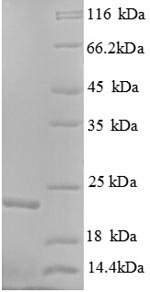

-AC1.jpg)
-AC1.jpg)
